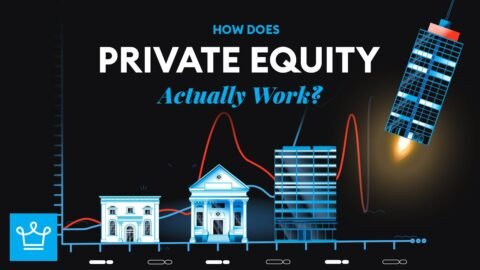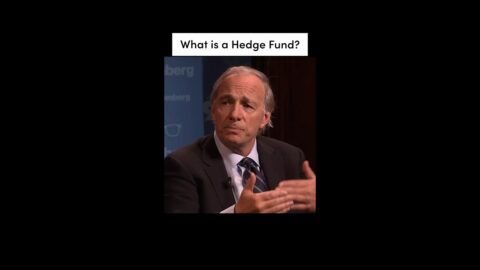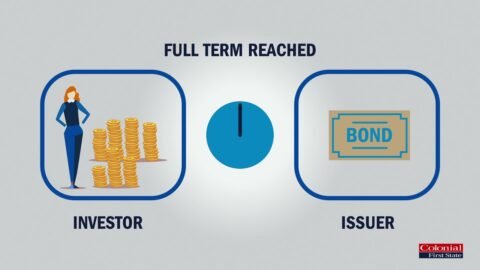Meet with PWL Capital: https://calendly.com/d/3vm-t2j-h3p References: https://zbib.org/3afb67c29fa64cbe95ae9cabf409542d …
source
You might like

5 Best Tools to Screen & Analyse U.S. Stock Market | UP your investing game right now!
0 views
·
26 minutes ago










Obviously ESG includes in it radical left wing ideology that can in fact be quite damaging. If we are to ban companies engaging in harmful behavior then it can't be under the ESG mantra and will include excluding certain media companies for being too woke for example. Or for actively discriminating towards people right of center as one example would be.
There are other considerations such as life and work balance, fertility rate. To the extend capitalism need to be directed without going too far in destroying value then woke capitalism is a wrong direction. Environmental concerns can be valid too however, although fossil fuels are at this point necessary, so it is a complicated issue.
Regulators should modify what is the allowed way to select a slice of the market, or benefit specific firms towards a model that isn't woke capitalism even if alcohol and tobacco business would still get a worse rating. But so could hypothetically also be the case for Google, and Disney.
Another facet are activist groups and CEO's engaging in cartel tactics threatening advertisement towards others to enforce for example no criticism of their favored groups as happened with Musk on twitter who was threatened in such a manner.There the solution should be to shut down those organizations that play such roles and treat such attempt to exact such total control as a criminal activity. So part of a non woke capitalism that promotes good social outcomes would include also stopping the worst players from manipulating the markets, and corporations and other institutions used by the public for their own agenda at the expense of the greater good.
Is there an anti-ESG fund I can buy to get the excess returns that ESG buyers don’t want?
I think it is extremely simple, I do not want to participate and invest in any company that deals with alcohol, gambling, produce weapons to kill people and so on. I do not care if my returns are lower than some other index. I also do not care what is the underlying effect down the road on companies behavior. It's a moral thing. We can debate about fossil and stuff but there are industries that I believe are pure evil and i do not want to put my money in them thats all^^. The example of wheat grass is a bad one in my opinion. A better one would be knowing that a hospital employs nurse feeding poison to a patients to optimize their bottom line and not wanting to be part of that.
I think that there might be some merit to your analysis, but I think the vastly neglected side of your analysis is the fact that in order for companies to go green, money needs to be invested in them to do such. Specifically for going green. Otherwise it is entirely up to the government.
« Climate, climate, climate » what about the exclusion of adult entertainment, alcohol, weapons etc. ?
This seems to me like, at best, an incomplete analysis. I'm an ESG investor and I've never thought about cost of capital. (Because I wasn't knowledgeable enough to have that thought!) To me, the best thing about ESG investing is the shareholder activism that the larger ESG funds engage in. They push shareholder initiated proposals, and work with companies behind the scenes as well, to pressure them to be better for the earth and for society.
I also think it's a bit silly to admonish us that we shouldn't expect higher returns. For decades (literally), mainstream naysayers told us over and over that we would have lower returns. After a while, enough data came in falsifying that claim, that they couldn't get away with saying that anymore, so they stopped saying it. Telling us now, that our returns won't be better, is just moving the goalpost. We don't do it to beat the market. (Morningstar, a site I follow and have learned a ton from, was among those naysayers. Now they've changed their tune, probably not out of any great conviction but more because they have to grapple with the fact that the number of investors interested in it has grown explosively, and they need to support that growing segment of the investing community – the same reason, I suspect, that many mainstream fund companies have finally started adding ESG funds to their lineup. I don't trust Morningstar's globe system at all. I do look at it sometimes, but more to dig into the underlying numbers, and I take those with a grain of salt. I prefer, whenever possible, not to invest with those mainstream fund companies, but to stick with the companies that pioneered the ESG (or originally "SRI", a term I still prefer) investing space in the first place – the ones that were ESG "when ESG wasn't cool". Those OG companies make ESG investing their central purpose, and make it their business to be expert at it. I mostly invest with Pax World (recently acquired by Impax Asset Management), Domini, and New Alternatives, with a few others thrown in here and there over the years. I trust these firms way more to be working for my values and not against them.
The article by Hartzmark and Shue isn't even peer reviewed. I normally like your videos because they integrate research, but basing an entire argument on a sincle, pre-print paper is simply poor research methodology. No one has has tested the methodology, and because it is a preprint, it exists outside the academic discourse and therefore is less challenged.
I'll be wary of your videos in the future. If you're uncritically accepting the conclusions of preprints, rather than doing proper research with papers like "Modelling sustainable investing in the CAPM" by Hens and Trutwin, I can't trust you to present the research to a nonspecialist like myself.
I was thinking about this yesterday so I searched it up before writing an article. Will watch before writing.
Huh well… I guess this is just as true for SRI investing since this is just a stricter version of ESG. Guess I will go with the normal MSCI World then and not invest into the MSCI World SRI anymore. Pitty though. Feeling good about my investments and not owning Nestle and such were my reasons why I preferred SRI.
13:58 It should not be investor's concern, there are regulatory and protection agencies that are tasked with the enforcement. Perhaps depriving brown firms of easy access to capital would reduce their ability to bribe politicians and litigate against public interest?
I'm holding the Vanguard ESG total market funds for both my US and International market exposure. They have a simple exclusion for fossil fuels, tobacco, gambling so you're slightly overweight tech without just buying QQQ. They move in between total market and large growth funds. I think it gets rid of some large cap value traps as well. I'll get value from small and mid with high profitability 😜
In a long term non-ESG companies can be less profitable due to one-off systemic risks of government attack on them with windfall taxes and regulations.
The first on the list is coal mining and landlords as lowest in ESG rating.
The issue, to me, is that so many of the ESG metrics are subjective. One of the metrics is simply hiring an ESG focused Executive. So simply hiring someone and giving them a title, has a positive effect on a corporation’s ESG Score, even though that executive may have absolutely no responsibilities aside from public relations. Another metric is carbon offsets. (An “industry” that is itself is based on subjective metrics.) So choosing one offset over the other, neither of which is proven to offset much of anything, may result in a less favorable ESG rating. ESG just doesn’t work as intended.
I disagree with using the argument of "allocating more investment to green firms than brown firms will not make green firms greener and will make brown firms more brown". Because, if the effect of raising the cost of capital of brown firms is big enough, they may eventually run out of business in favor of green firms. And that would be a net positive for a sustainable industry, even if it takes some years until it happens.
The primary argument here that decreasing the cost of capital for green firms doesn't make them much greener and that increasing the cost of capital for brown firms makes them less green makes a fair observation, but the conclusion drawn that sustainable investing is counterproductive doesn't follow. Over the long run, green firms will outcompete browner ones because of their lower cost of capital. It doesnt happen overnight, but the process is aided by the green firms' focus on innovation while brown firms focus even more on doing the same things they have always done in the same way. This may work for the brown firms in the short term because their existing profit margins are currently better than the green firms, but innovation will ensure that this advantage will eventually flip the other way. As the portion of all firms that are green grows, the economy as a whole will get greener while the brown firms join the dust bin of history along with the buggy whip manufacturers.
Given how much it's about woke shibboleths and ignoring things like race and sex differences, yes, and it goes along with the general short term thinking we've been seeing. Things like education inflation, other signaling issues, and dysgenics should be very high on any sane society's priority especially as they're disproportionately caused by women. We can't even see much advancement in the social sciences especially in say abating crime which is an insane cost for all societies or the use of genomics because resources are instead devoted to counterproductive things
I get the green vs brown counterargument but ESG funds also exclude corporations that produce controversial weapons, that have discrimination in their workplace, that irresponsably uses private information, among other things. I think a question we have to ask ourselves is if we are morally ok with our capital going to corporations that do stuff like that.
Thanks for this, Ben. I was looking for counter-arguments against ESG, as I'm about to tell my financial advisor to convert my holdings to ESG equivalent assets.
While I appreciate the idea that ESG & SRI may not be leverage to convert a brown company green or make a green company much greener, I'll have to read the report that suggests that divestment from brown companies makes them browner, which is contradictory to the other anti-ESG idea that the individual investor divesting has no effect on the companies they're divesting from. Over the long term, I guess both can be true at different times — little effect on companies until a critical mass is induced by the popularity of that divestment creates a financial burden to the brown company.
The banner/plow classifications are interesting, too, and should be a simple way for people to think about and identify why it is they want to pursue ESG to begin with. For me and my family, our goal is to eventually start using as much capital to support more local ESG companies and ensure a percentage reaches the communities we are most concerned about.
Thank you for the thoughtful analysis, Ben. It's the first video of yours that I've come across and will, undoubtedly, investigate more.
Hi Ben, thank you for this insightful series on ESG investing. In my research I have stumbled upon this paper by LH Pedersen et al. (2021) of AQR which discusses an ESG efficient frontier and specific types of ESG investors. From my understand this paper has gained quite a bit of traction in academia. I would really appreciate if you could include this paper in your future discussions on this topic. Thank you very much in advance.
Has the premise that ESG investors care if brown firms get greener been substatiated? I'd think a risk to future returns would be the motivating factor. Feels like a strawman tbh.
That's putting the cart before the horse. Investing in a brown company isn't going to make it more green unless they previously promised to do more green things with more money. Raising the cost of capital for brown companies is likely to shrink them, so that even if they become proportionally more brown, they're less brown in an absolute sense.
Great video (I've never seen a bad video from you!). However, I think the nuances here are that the studies are critical of ESG's current implementation and branding and a bit of an extrapolation that this would continue into the future. Instead of mistaking its current implementation with ESG itself, we should focus on the premise behind ESG investing and try to solve the issues with current implementation.
ESG is a scam on many levels, and more pollution is the least of its problems. Its all apples to oranges comparisons anyway, so the ratings say nothing about the relative pollution. Is Google really 'better' for the environment than a gold miner, or is google just not in a resource production business ? If Google produced the same amount of gold out of the ground as Freeport McMorran, would it still have a better ESG score, or would in fact a professional miner company know better how to mine properly than some search engine company that knows nothing about resource extraction ? Another problem is the S and G, these things are so political that it really depends on the rater's views on the company, as much as its governance is good or bad. Also, ESG can lead a company dangerously astray, like is the case for Disney, which was not a big polluter, but they decided to 'feminize' all of their productions and push diversity very hard in their employees, to pump up their S and G ratings. This has actually lead to disastrous financial results, as most people, and Florida politicians, don't want the left coast diversity agenda pushed down their throats. All of Disney's woes have NOTHING to do with the environment, and EVERYTHING to do with the current social war that is raging, a war that Disney's investors really cannot afford to fight, and frankly, should not be fighting. Disney should just let the protestors in the streets drive social change, just sell lots of cool movies and make money for its investors. This kind of self-immolation actually doesn't do any real good, and just lights investor money on fire, which is most likely not why most Disney investors own the stock.
Just discovered your channel. Thank you for explaining complex debates in an understandable and fair way – such an undervalued trait.
Brown companies will always be more profitable through their ability to externalize damage, pollution, depletion and other harms, vs a company engaged in the same business but trying to do right.
Great video and you covered the topic well.
That’s what I thought! Thank you for your analysis brother
Shareholder value should be the priority. Not an ideology.
The G makes sense and has always been part of the assessment when considering an investment but the E and especially the S is complete dogshit. Good video tho…